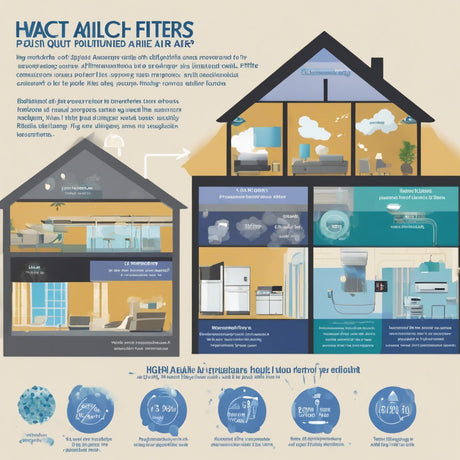- No products in the cart.
Understanding the Crucial Role of HVAC Filters in Indoor Air Quality
07
Mar
Introduction: In the realm of indoor air quality (IAQ), there's a silent hero that often goes unnoticed—the HVAC filter. While HVAC (Heating, Ventilation, and Air Conditioning) systems are primarily associated with regulating temperature, they also play a vital role in maintaining indoor air quality. Among the various components of HVAC systems, filters stand out as the frontline defense against airborne contaminants. Understanding their significance is crucial for ensuring healthier indoor environments.
The Importance of Indoor Air Quality: Indoor air quality significantly impacts human health and comfort. Poor IAQ can lead to various health issues, including respiratory problems, allergies, and even cardiovascular diseases. Factors contributing to poor IAQ include pollutants from indoor and outdoor sources, inadequate ventilation, and the presence of allergens such as dust mites, pollen, and pet dander. Effective IAQ management is essential for creating environments conducive to well-being, productivity, and overall quality of life.
The Role of HVAC Systems: HVAC systems play a dual role in indoor environments: regulating temperature and maintaining air quality. They accomplish this by circulating and filtering air throughout the building. While temperature control is essential for comfort, the filtration aspect is critical for removing contaminants and improving IAQ. This is where HVAC filters come into play.
Understanding HVAC Filters: HVAC filters act as barriers, trapping particles and pollutants as air passes through the system. They come in various types, including fiberglass, pleated, electrostatic, and HEPA (High-Efficiency Particulate Air) filters. The effectiveness of a filter is determined by its MERV (Minimum Efficiency Reporting Value) rating, which indicates its ability to capture particles of different sizes. Higher MERV ratings signify better filtration efficiency.
Impact on Indoor Air Quality: The primary function of HVAC filters is to remove airborne particles, including dust, pollen, mold spores, bacteria, and viruses. By capturing these contaminants, filters prevent them from circulating throughout the building, thereby improving IAQ. Cleaner air reduces the risk of respiratory problems and allergic reactions, creating a healthier environment for occupants.
Regular Maintenance: To ensure optimal performance, HVAC filters require regular inspection and replacement. Over time, filters accumulate dust and debris, reducing their efficiency and airflow. Clogged filters not only compromise IAQ but also strain the HVAC system, leading to decreased efficiency and higher energy consumption. Therefore, it's essential to adhere to a maintenance schedule recommended by HVAC professionals.
Choosing the Right Filter: Selecting the appropriate HVAC filter depends on various factors, including the building's size, occupancy, and air quality requirements. While higher MERV-rated filters offer superior filtration, they may also impede airflow, especially in older systems. Balancing filtration efficiency with airflow is crucial for maintaining IAQ without overburdening the HVAC system.
Conclusion: In the quest for healthier indoor environments, HVAC filters play a pivotal role. By capturing airborne particles and pollutants, they contribute significantly to improving indoor air quality. Regular maintenance and choosing the right filter are essential steps in ensuring optimal performance. As awareness of IAQ continues to grow, investing in effective filtration systems remains paramount for creating spaces where occupants can thrive in comfort and safety.













